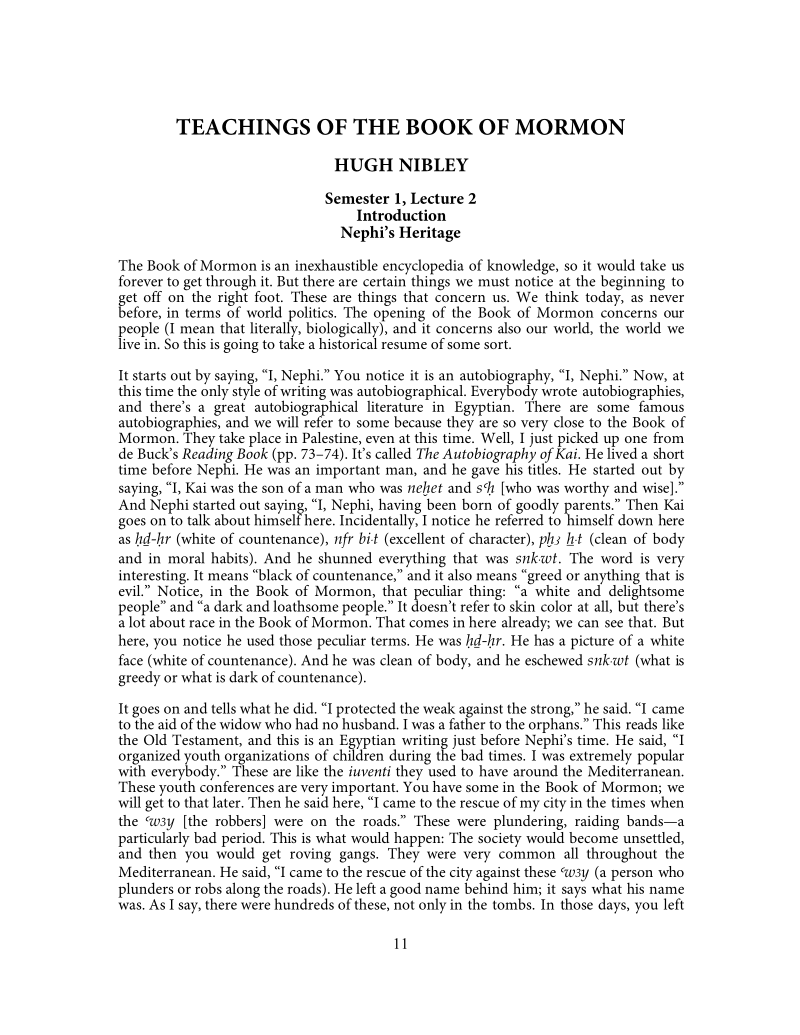Hugh W. Nibley compares the Book of Mormon's use of darkness to an ancient Egyptian autobiography.
- Type
- Speech / Court Transcript
- Hearsay
- Secondary
- Reference
Hugh Nibley, "Teachings of the Book of Mormon, Semester 1: Transcripts of Lectures Presented to an Honors Book of Mormon Class at Brigham Young University, 1988-1990," 2004, 11
- Scribe/Publisher
- Neal A. Maxwell Institute for Religious Scholarship
- Audience
- Reading Public
- Transcription
The Book of Mormon is an inexhaustible encyclopedia of knowledge, so it would take us forever to get through it. But there are certain things we must notice at the beginning to get off on the right foot. These are things that concern us. We think today, as never before, in terms of world politics. The opening of the Book of Mormon concerns our people (I mean that literally, biologically), and it concerns also our world, the world we live in. So this is going to take a historical resume of some sort.
It starts out by saying, “I, Nephi.” You notice it is an autobiography, “I, Nephi.” Now, at this time the only style of writing was autobiographical. Everybody wrote autobiographies, and there’s a great autobiographical literature in Egyptian. There are some famous autobiographies, and we will refer to some because they are so very close to the Book of Mormon. They take place in Palestine, even at this time. Well, I just picked up one from de Buck’s Reading Book (pp. 73–74). It’s called The Autobiography of Kai. He lived a short time before Nephi. He was an important man, and he gave his titles. He started out by saying, “I, Kai was the son of a man who was nehet and s>h˙ [who was worthy and wise].” And Nephi started out saying, “I, Nephi, having been born of goodly parents.” Then Kai goes on to talk about himself here. Incidentally, I notice he referred to himself down here as hd-hr (white of countenance), nfr bi.t (excellent of character), pˆh h.t (clean of body and in moral habits). And he shunned everything that was snk.wt. The word is very interesting. It means “black of countenance,” and it also means “greed or anything that is evil.” Notice, in the Book of Mormon, that peculiar thing: “a white and delightsome people” and “a dark and loathsome people.” It doesn’t refer to skin color at all, but there’s a lot about race in the Book of Mormon. That comes in here already; we can see that. But here, you notice he used those peculiar terms. He was hd-hr. He has a picture of a white face (white of countenance). And he was clean of body, and he eschewed snk. wt (what is greedy or what is dark of countenance).
- Source Link
- https://scholarsarchive.byu.edu/mi/70/
- Citations in Mormonr Qnas
The B. H. Roberts Foundation is not owned by, operated by, or affiliated with the Church of Jesus Christ of Latter-day Saints.

